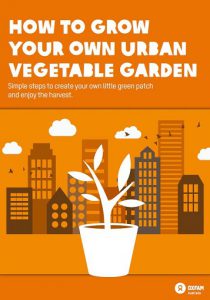Today’s actions have a big impact on future generations, but we can play our part in preserving finite resources and limiting environmental impact through sustainable consumption. Our last post revolved around the advantages of building a garden at home, both for health and environmental benefits, and how often the best part of cultivating a garden is sampling the fresh, delicious fruits (and vegetables) of your labour. This post will look at why sustainable consumption is so important, and some tips on growing your own food in a sustainable way.
Download the guide ” How to make an urban garden“

Photo: Jakub Kapusnak / Unsplash
Sustainable consumption is a practice as old as human history. Ancient civilisations relied on food they grew themselves and resources they had at hand, and as such understood the importance of sustainable practices such as rotating crops, crop diversity, natural pest eliminators and using waste to enrich the soil
In the 20th Century, with the focus on economics and trade, a new model of overproduction came into play. This has resulted in careless consumption, high levels of waste and issues like climate change. But practicing sustainable consumption and living can reduce our impact and slow the pace of environmental damage that scientists are warning could have disastrous implications for the next generation.
Sustainable consumption does not depend exclusively on eating foods harvested from your balcony, terrace or home garden (no need to start panicking about how you’ll fit chickens into your city apartment!). Supporting local industries, vendors and farmer’s markets are also a big part of ensuring your consumption is sustainable. Aside from being enjoyable places to shop, they reduce energy consumption, food miles and waste.
Urban gardens take this one step further and are a living example of how we can fight climate change through a change in lifestyle. Urban gardens create fresh and healthy crops, with fewer preservatives than those found on supermarket shelves. And at home, a garden is an excellent (and highly satisfying) way to start living sustainably.
Want to put it to practice in your life? Use our handy tips below to take the first steps to growing a garden at home.
Three tips to keep your organic garden at home

Photo: Arnaldo Aldana / Unsplash
Learn, plan, reap
Remember to do your research and plan your garden before you begin Whether you have visions of a bumper vegetable or fruit harvest, a legume patch or a herb garden, each plant will need different amounts of space between them and grow to different sizes (think of the difference between a pumpkin and a carrot, even if both begin as tiny seedlings). You might want to plan for particular plants that complement each other, such as basil and tomatoes, and think about what will grow best depending on the season. It’s often helpful to draw a diagram or map up before you start.

Photo: Gemma Evans / Unsplash
The two essential elements
Plants aren’t like children – they don’t need much attention. But they do thrive on sunlight and water. For a veggie patch, your garden has to have direct access to sunlight. It is also advisable to water your garden early in the day because this is the time for minimal evaporation. You may want to invest in an automatic sprinkler system for times you are away, and set the timer to first thing in the morning.

Photo: Kyle Ellefson / Unsplash
Fertilise the natural way
Artificial fertilisers and organic gardens do not mix. However, natural fertilisers can help make your soil healthy and your produce grow fast and tasty. Horsetail, garlic and nettle water prevent diseases and pests that can contaminate your garden. Similarly manure, earthworm hummus, green manure, algae and crop residues make great natural fertilisers. Experiment with different ones and see which works best for your garden.

Photo: Farsai C / Unsplash
Ready to build your garden and harvest your own fresh produce? So many delicious meals are ahead of you. This is small (and fun!) investment for a large return, both for you, our land and future generations.

Grow your own urban vegetable garden
Download our free eBook and learn the simple steps to create your own little green patch and enjoy the delicious harvest.
Download guide